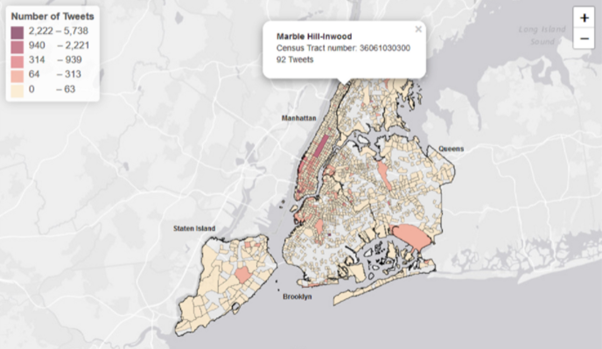The tool incorporates bot detection and community level geospatial analysis, in order to filter out artificial content, while detecting stress hotspots over time.
The system prototype can detect geographical hotspots where public mental health might be suffering and will allow public health authorities, healthcare workers and wellbeing organisations to focus their attention where it is needed most.
It comes as evidence suggests rises in depressions, anxiety and other disorders due to the COVID pandemic.
The details have been published in the journal, Health and Place.
One of the researchers Dr Martin Sykora, of Loughborough’s School of Business and Economics, said: “The mental health burden has not been felt equally, and has often fallen most on those with the least means.
“And while social media analytics tools are increasingly used to assess conversations around certain issues, the veracity of the content and its relation to local communities is not particularly well understood.
“Our example tool highlights some of these issues.”
Social media analysis - Twitter in particular - has been shown to be an effective platform for detecting mood and affective states.
However, the use of this data is complicated by automated social posts known as bots - computer-controlled accounts often associated with spreading fake news, conspiracy theories and promoting propaganda.
Learning more about how bots operate and their behaviour. Being able to identify them will allow the online tool to give a much more accurate picture of public mood.

A map of New York City showing negative mood hotspots during the COVID outbreak
As a proof of concept, the team from Loughborough, Zurich (Switz), Boston (US), London and San Francisco (US) used online tracking tools they had created to study the emotions of 34,140 tweets, posted between January 1, and October 23, 2020.
The tweets were from people who lived in New York at the time.
After calculating and identifying hot spots of above-average emotions or stress the team created a map showing geographic clusters of negative emotions linked to the spread of the coronavirus outbreak.
Dr Suzanne Elayan, also involved in the research, said: “Bots have increasingly played a role on digital platforms by substantially skewing topics that may influence existing applications and study findings, often in unknown ways.
“Hence there’s a real need to identify such ‘artificial’ actors and their impact, especially around localised conversations during times of crises. We are now conducting ongoing research work on how bots can influence and propagate emotional content on social media at scale, and the impact and disparities of digital places on local communities.
“For instance, integrating socio-ecological environment information, such as employment rate, air pollution, at a low, community level, census geography.”
Read the full paper, Real-time geospatial surveillance of localized emotional stress responses to COVID-19: A proof of concept analysis, here.
ENDS
